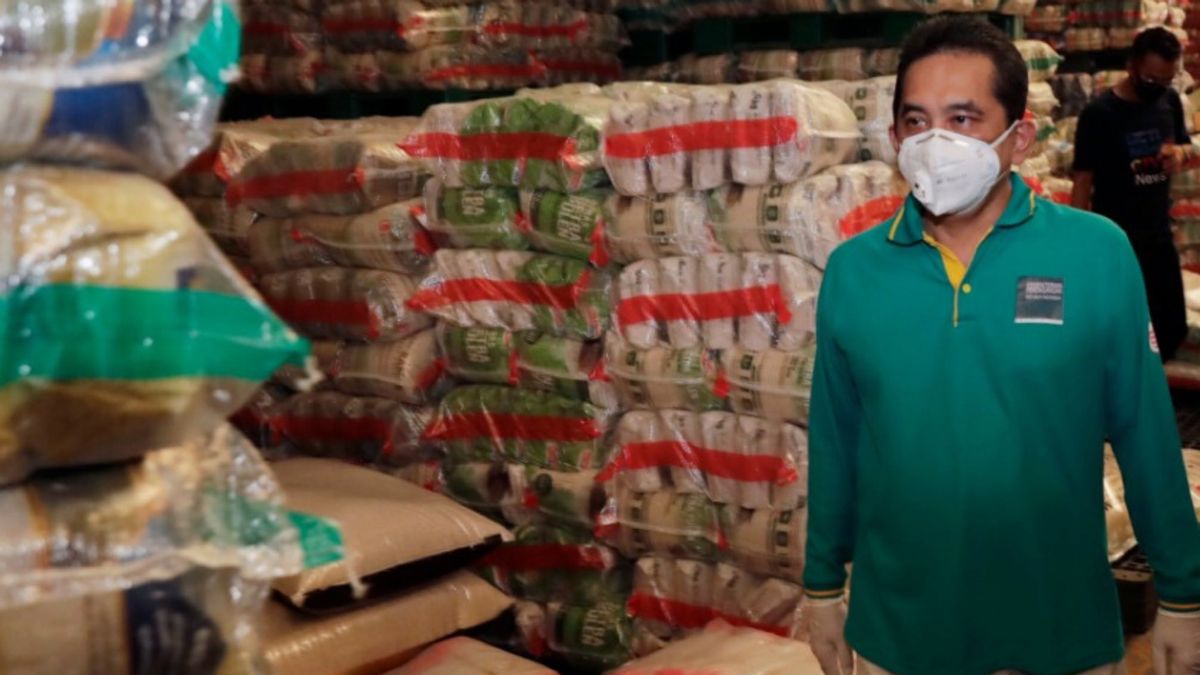JAKARTA - The Ministry of Trade conducted an inspection to monitor the availability of staple food stocks at the Cipinang Rice Main Market (PIBC) and PT Food Station Tjipinang Jaya to ensure that national rice stocks ahead of the fasting month of Ramadan and Eid al-Fitr are safe. Thus, there is no price increase that can affect national inflation.
Minister of Trade Agus Suparmanto said, after conducting the field visit, it was confirmed that the national rice stock availability was safe in the midst of the corona virus pandemic or COVID-19.
"Nationally, I make sure the rice stock is sufficient for the needs of the people ahead of the fasting month and Eid al-Fitr 1441 H. Even until the next harvest. Safe and good (mantab right). The national rice price is very stable even during March it does not cause inflation," he said, through a written statement received by VOI, in Jakarta, Friday, April 17.
Agus said, even though in the midst of the implementation of Large-Scale Social Restrictions (PSBB) against COVID-19 in DKI Jakarta and several other areas, the community would have no trouble buying staples to welcome the coming month of Ramadan.
According to the Trade Minister, the current national rice stock for fasting and Lebaran is 3.38 million tons. Rice at Perum Bulog has an available stock of 1.42 million tons, 1.2 million tons of stock in mills, 728 thousand tons of stock in traders, 28,431 tons of stock at Cipinang Rice Main Market (PIBC), and stock in the BKP-assisted Community Food Barn. amounting to 2,939 tons.
Not only that, he continued, there will be additional rice stocks by entering the main harvest season continuously until August 2020. The national rice stock will receive an additional 19.8 million tons.
"Thus, the need for rice is estimated at approximately 2.5 million tons per month and in anticipation of a long period of handling COVID-19, I am optimistic that rice stocks and production will meet national needs by the end of December 2020," he explained.
Meanwhile, said Agus, nationally, the average medium rice price of IDR 10,800 per kilogram (kg) was stable compared to last week, and increased by 1.89 percent compared to last month. The highest price occurred in Bulungan, Tj. Selor is IDR 13,429 per kg and the lowest in Jambi is IDR 9,000 per kg.
The average price of premium rice was recorded at Rp12,400 per kg, relatively stable compared to last week and last month. Meanwhile, continued Agus, the highest price was in Pekanbaru at Rp. 14,656 per kg and the lowest in Banda Aceh at Rp. 10,667 per kg.
In the midst of the COVID-19 pandemic, Agus made a breakthrough by cutting the rice distribution chain. The goal is that the distribution is smooth and quickly distributed. The price of rice is also made affordable for the community. So that there is no inflation in rice commodities, namely by not increasing the highest retail price (HET) for the final consumer. But by increasing the government purchase price at the farm level.
According to Agus, thus, in the upstream there is an increase in welfare while in the downstream the prices remain stable. This breakthrough is contained in the Minister of Trade Regulation No. 24/2020 concerning Determination of Purchase Prices for Grain or Rice. In this regulation, the Ministry of Trade sets the Harvested Dried Grain (GKP) at the farmer level at Rp4,200 per kg and at the milling level Rp4,250 per kg. Meanwhile, milled dry unhulled rice (GKG) at the grinding level is IDR 5,250 per kg and IDR 5,300 per kg in the Bulog warehouse.
Agus explained, for rice, the government purchase price at BULOG's warehouse was IDR 8,300 per kg. Meanwhile, the national average price of staple goods as of April 15, compared to a month ago, March 16, was generally relatively stable. Decrease or increase in the number 0 to 5 percent.
"Stable (decreased / increased 0-5 percent) such as rice, cooking oil, wheat flour, soybeans, beef, eggs, and garlic. Prices of staples fell by more than 5 percent, such as chicken, red chilies. curly and large red chilies. Meanwhile, commodity materials that had risen above 5 percent, such as sugar, shallots and red chili peppers, "he said.
Rice Condition at PIBC
After conducting a survey at PIBC Jakarta, it is known that the condition of rice supply per day for the past week is 3,096 tons, which is above the normal PIBC supply of 2,500-3,000 tons per day. The current rice stock at PIBC is 28,431 tonnes, only slightly below the normal stock of 30,000 tonnes and sufficient to meet the needs of DKI Jakarta for the next nine days or so.
Meanwhile, the price of rice per April 16 PIBC compared to last week tended to decline, especially for Muncul I rice, Muncul II rice, IR 64 I, and IR 64 II rice. The average distribution of rice from PIBC until April 16 was 2,935 tons, up 1.84 percent compared to last month. The distribution is made to the island of Java and between islands, the largest being to DKI Jakarta at 65.72 percent.
Meanwhile, continued Agus, the realization of inter-island rice trade at PIBC up to April 14 was 4,685 tons. The largest inter-island trade was to Pontianak by 39.68 percent and Medan by 14.83 percent.
Meanwhile, the stock of basic necessities at PT Food Station Tjipinang Jaya, which is a Regional Owned Enterprise of the DKI Jakarta Provincial Government, is still relatively large. There are 40,000 tons of rice, 200,000 tons of PIBC rice, 1,500 tons of eggs, and 5.7 million liters of milk. Other staple goods such as wheat flour have a stock of 1,000 tons, 6,000 tons of sugar and 1.5 million liters of cooking oil and 2,000 tons of garlic.
"With the large amount of stock available at PT Food Station, the needs of the people of DKI Jakarta are still quite safe. So there is no need to panic and buy excess staple goods. Every day," he explained.
Inspection of Garlic Importer's Warehouse
Meanwhile, Trade Minister Agus Suparmanto also monitors the warehouse for garlic and onion importers. It is known, the stock of garlic is so large that the retail price in the market has decreased drastically. Currently, the price of garlic is stable at IDR 32,000 per kg.
Agus said the drop in garlic prices was due to the Ministry of Trade's breakthrough policy which provided relaxation by exempting import approvals and surveyor reports for garlic and onion commodities.
"Currently there are about 34 containers @ 29 tons of garlic and onions already in Tanjung Priok Port and will continue to enter from China," he said.
The Minister of Trade appreciated the synergy between the central government, regional governments, and business actors who continue to maintain stable supply and prices of bapok so that people can get basic necessities at affordable prices.
"Through market monitoring which is routinely carried out by the Ministry of Trade, it is hoped that bapok prices will continue to be controlled, especially in regions throughout Indonesia," he said.
The English, Chinese, Japanese, Arabic, and French versions are automatically generated by the AI. So there may still be inaccuracies in translating, please always see Indonesian as our main language. (system supported by DigitalSiber.id)













